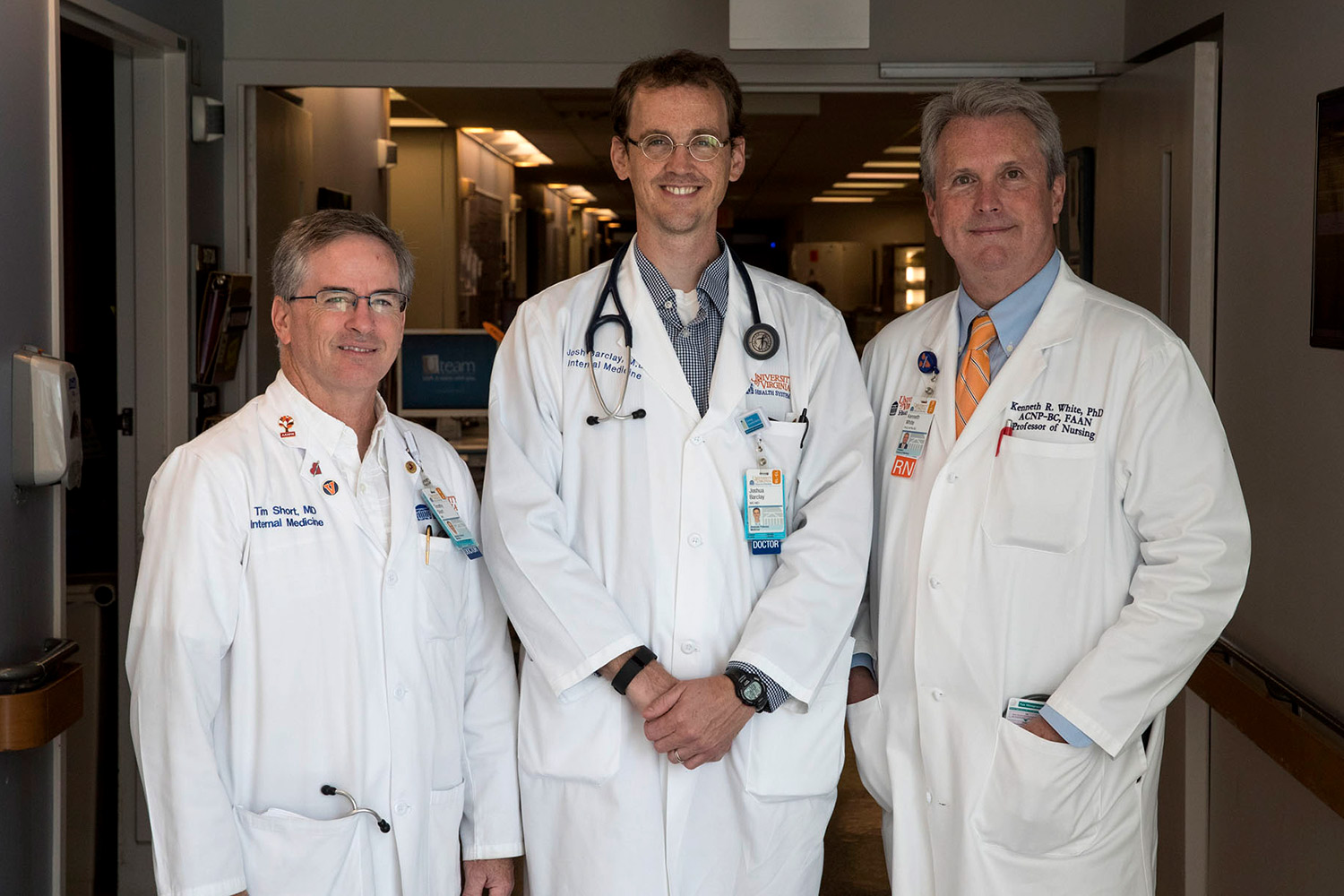On Tuesday mornings on the third floor of the University of Virginia Medical Center, Ken White, professor and associate dean of strategic partnerships and innovation at UVA’s School of Nursing, meets with a team of health care professionals to receive patient reports.
Throughout the day, White will encounter patients with life-limiting conditions and will work with them and their families with one goal in mind: decreasing suffering by determining how best to improve their quality of life.
Such is the mission of White’s specialty, palliative care.

Dr. Tim Short, Dr. Joshua Barclay, and Ken White, a registered nurse and nurse practitioner, specialize in palliative care at the University of Virginia Medical Center. (Contributed photo)
“Working in this space is sacred work,” White said. “We are invited into the lives of people we don’t know, at a time when it’s difficult for everyone. We have to instill trust in people because this is their most vulnerable time.”
White’s shift into palliative care came while he was a health care administrator doing research on the economic benefit it could provide to his organization.
“My research showed that it improved quality of life and patient satisfaction,” White said. “It turns out there’s an economic benefit to palliative care, too, but that’s not why we do it. We do it because it’s good medicine.”
White, who is also a registered nurse, adult/gerontology acute care nurse practitioner and a certified palliative care nurse practitioner, said educating others on the benefits of palliative care can lead to drastically improving the quality of life for many patients and can also help patients’ families cope with the circumstances.
“We want to give all caregivers some base knowledge in palliative care,” he said. “This type of care is a real gift to society, our patients and their families. So investing in this is only going to make everyone give back more compassion.”
To advance those efforts, the School of Nursing, School of Medicine, Hospice of the Piedmont and Sentara Martha Jefferson Hospital are collaborating to make education available through the Third Annual Melton D. and Muriel Haney Interprofessional Conference, “Honoring Differences at the End of Life,” to be held Sept. 17.
In an interview with UVA Today, White emphasized some of the benefits of and challenges to palliative care.
Q. What exactly does palliative care entail?
A. We work with quality-of-life issues, so we try to get to the heart of what makes people tick and what they live for. Then, we work with the symptoms of their disease and sometimes the symptoms that result from their treatments. We also work with primary physicians and their teams to add a layer of support to families in decision-making.
Often, these topics are hard to discuss. In our society, we don’t really bring up death and dying, and in many cases, people aren’t prepared with advance directives, which are written legal documents that state a person’s wishes when he or she can’t speak for him- or herself.
Q. What are some common myths about palliative care?
A. There is a distinction between hospice and palliative care, and that often creates confusion. Palliative care is the science and philosophy of caring for people. Hospice, in the U.S., is a Medicare insurance benefit and goes into effect when two physicians sign saying the person has a terminal diagnosis and has six months or less to live. We do partner with hospices, though, with the goal of getting patients back to their homes or in their local communities.
Another thing is that not all palliative care is end-of-life. Palliative care can start when the diagnosis is made. End-of-life is just the final hours in the patient’s last days.
Q. How do you handle the sometimes difficult conversations that come with the territory of palliative care?
A. We start with identifying the goals of care by asking questions like, “What do you want this treatment to do for you?,” and when there’s a treatment that we know is not going to work, or it’s been tried and didn’t work, when there’s nothing else that we can try, we have to let them know. Ultimately, we want to help decrease suffering as much as possible.
Q. What are some other challenges to palliative care?
A. A lot of patients come from rural areas, and access to palliative care in rural areas is not very good. We’re trying to promote new and better ways to address this, and are talking about ideas like using telemedicine.
There is also some focus on honoring differences in cultural and spiritual diversity when it comes to palliative care.
Q. Have you noticed any societal shifts in recent years in terms of the approach to palliative care?
A. Nationwide, in the last 10 years, there has been a meteoric rise in the number of hospitals that have palliative care services. We also have more training programs. There is a specialty program here at UVA in the nurse practitioner program that focuses on palliative care, because there still is not enough supply to meet the demand for physicians and nurses with this kind of training.
Q. What do you think practicing clinicians as well as members of the community have to gain from education on the topic?
A. There is a big need to educate all caregivers about palliative care. There are two types of palliative care: primary and specialty. Specialty palliative care is located in places like UVA, but for the average, small hospital in America, caregivers can practice primary palliative care and can learn enough about it to integrate it into their practice without referring to specialists.
The more people know about this topic, the more likely they are to request palliative care or have their own advance directives filled out.
Media Contact
Article Information
August 25, 2016
/content/comfort-care-good-medicine-patients-life-limiting-conditions

